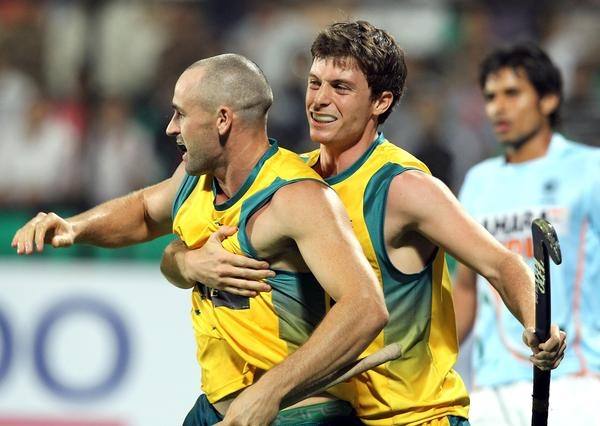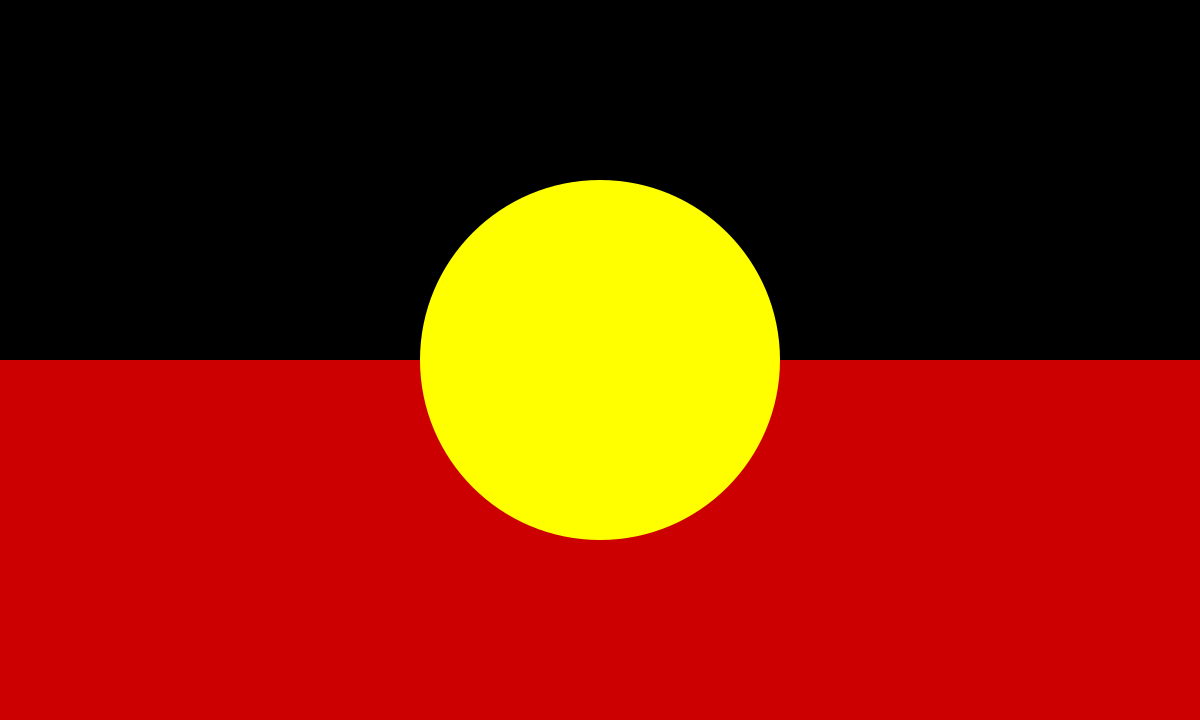The Kookaburras have all but booked a spot in the semi finals at the 2010 World Cup, defeating Spain 2-0 in India.
The win sees the Kookaburras secure second place on the points table of pool B, now one game ahead of Spain with a superior goal difference, with only one match remaining in the round matches.
Knowing a spot in the semi finals was on the line, the Kookaburras started the match strongly, making some genuine shots on goal in the opening ten minutes.
Striker Grant Schubert was handed a golden opportunity when he found himself alone in front of the goal, but couldnt control the ball and the score remained 0-0.
Spain themselves had an opportunity to score early in the match after being awarded a penalty corner at the seven minute mark, however the powerful flick was saved on the line by defender Kiel Brown.
An Eddie Ockenden forced penalty corner gave defender Luke Doerner an opportunity to extend his good form from the previous match against South Africa, with the Victorian converting his 6th penalty corner goal for the tournament and giving the Kookaburras the lead.
Spain were determined to hit back as soon as possible, and were awarded several penalty corners in the late stages of the first half, with their last one being saved by Luke Doerner on the goal line.
With time running out Spain took more chances with their counter attacks in order to get on the scoreboard, ultimately exposing their defense. After Spain received a yellow card the Kookaburras took advantage, with Glenn Turner scoring Australia’s second goal at the 60 minute mark to hand the Kookaburras the victory.
Record Breakers:

Defender Luke Doerner was named man of the match, scoring five of the 12 goals, four from penalty corners.
After a slow start to the tournament in which they lost their opening game to England, the Kookaburras followed up their recent 5-2 victory over India with an even more impressive victory over South Africa.
South Africa knew they needed to strike early to have any chance against the higher ranked Australian team, and threw everything they had in the opening minutes.
It appeared likely to pay dividends when they were awarded the first penalty corner of the match. However a great run down by Kiel Brown denied them any real shot on goal.
The opening minutes remained fairly even, with South Africa showing no signs of intimidation.
The Kookaburras looked likely to score their first goal when a shot on goal hit the post, with Des Abbott there to slot in an easy goal. However an act of desperation from the South African goalkeeper saw him beat Abbott to the ball, clearing any danger.
However Australia’s first goal was inevitable, and eventually came via a ferocious penalty corner goal to Luke Doerner.
As the half continued Simon Orchard became a key play maker for the Kookaburras in the midfield, while Jamie Dwyer was seemingly everywhere, causing headaches for South Africa as the Kookaburras worked their way on top.
Dwyer’s presence became even more evident when he received the ball in the circle and instinctively passed to team mate Glenn Turner without hesitation who inturn slotted Australia’s second goal with an open net.
From here the warnings signs began to sound for South Africa, and things were only getting worse when dangerous striker Des Abbott continued to become a focal point near the goals.
After his first shot on goal was stopped by the keeper, he received a second chance when only minutes later a reverse stick shot to the top left corner beat the keeper after he pushed the ball to space to create the opportunity.
The fitness of the Australian team became evident as the team continued to run hard, creating more space and opportunities which led to several interceptions.
Luke Doerner’s second penalty corner goal with only a minute remaining in the half was topped off by another penalty conversion, this time going to Fergus Kavanagh who scrambled for the ball on the goal line after the initial shot was blocked, making no mistake on his second shot and sending the Kookaburras into half time with a five goal lead.
Determined to continue their momentum, the Kookaburras continued to show no mercy in the second half, with youngster Matthew Butturini showing a great deal of class after receiving a pass from Orchard, finding space and drawing out the keeper to score on a tight angle.
After yet another penalty corner goal to Doerner it was evident that whatever issues the Kookaburras had with converting goals from their first match were now well and truly sorted.
In a good reward for his efforts, Jamie Dwyer eventually made his way onto the scoresheet, scoring two goals after some great team play involving Orchard, Graeme Begbie and Grant Schubert. In what was undoubtedly his best match of the tournament to date, Dwyer demonstrated exactly why he is regarded as the best player in the world today.
Australia’s 10th goal came after a good cross from Mark Knowles found the stick of Glenn Turner, who was surrounded by the South African goalkeeper and defenders who were forced to watch as the ball headed to the back of the net.
Doerner then finished off the match with the last two goals to achieve a World Cup record for the biggest winning margin.
For as good as the Kookaburra strikers were, the defenders were equally as good, ensuring that goalkeeper Nathan Burgers had a relatively quiet night.
Earlier:
It was a case of 16 versus 19,000 when the Kookaburras took on India in front of their home crowd in New Delhi at the 2010 World Cup, with the Kookaburras rising to the occasion to win 5-2.
The win keeps the Kookaburras well in truly in the hunt for a semi finals berth, moving them to second place in their pool after Spain suffered a surprise 2-1 loss to Pakistan in the earlier match.
Australia’s scoring difficulties from their opening game against England, in which they failed to convert numerous shots on goal, was a distant memory after the Kookaburras opened their scoring account only two minutes into the match.
Veteran defender Liam De Young made it look easy after rebounding his own ball after his first attempt on goal hit the cross bar, putting away the goal to give the Kookaburras a 1-0 lead.
The goal did little to quiet the deafening Indian crowd, however the Kookaburras were given even more breathing space when Glenn Turner scored his first goal of the tournament following a deflection on the goal line from a penalty corner taken by Luke Doerner.
India refused to be intimidated by the scoreboard, continually attacking their goal in a bid to work themselves back into the game.
Australian goalkeeper Nathan Burgers was up to the task, making several good saves while Liam De Young and Eddie Ockenden emerged as key play makers for the Kookaburras at the other end of the pitch.
India continued to push for their opening goal, putting the Kookaburras defence under huge pressure. This allowed for youngsters such as Graeme Begbie, Matthew Butturini and Simon Orchard to show maturity beyond their years, while full back Luke Doerner was also solid on the last line of defence.
After taking India’s attack the Kookaburras were keen to further extend their lead, with veteran Grant Schubert producing a great tackle outside the circle controlling the ball and finding Rob Hammond in the circle who in turn found Des Abbott on the goal line to score Australia’s third goal.
Despite Australia’s best efforts eventually India made their way onto the scoreboard, scoring with only 10 seconds remaining in the first half after a long cross found Vikram Pillay unmarked in the circle.
It didn’t take long for the Kookaburras to respond after half time, with Luke Doerner converting his first penalty corner of the tournament to extend the Kookaburras lead to 4-1.
Only minutes later Glenn Turner was given a clear shot at goal after being unmarked in the circle, ultimately ending India’s chances and taking the edge off the vocal crowd.
A goal to India at the 53 minute mark helped make the scoreboard look more respectable, but the damage was already done with the Kookaburras claiming their first victory at the 2010 World Cup.
– Hockey Australia




